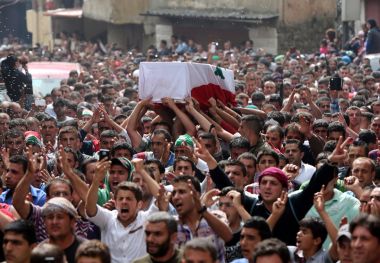'They will slit our throats for no reason'. Lebanon's Christians fear IS attacks

Christian villagers in Lebanon, near the Syrian border, are arming themselves against the looming threat of Islamic State (IS) fighters, the Times reports.
IS has begun a land grab around the area it already controls in the Bekaa Valley, where at least 21 Lebanese soldiers and policemen are being held hostage by between 2,000 and 3,000 fighters from IS and the Al-Qaeda-linked group Al-Nusra Front.
The farmland in the Bekaa Valley is largely inhabited by Shia Muslims, with Sunni and Christian minorities. In response to the threat, villagers are arming themselves, ready for attack, with support from US weapons deliveries.
"We are a minority and we are under threat by the jihadists," the commander of the volunteer guards in Ras Baalbek, told the Times.
Having seen the devastation brought as IS have spread across parts of Iraq and Syria, many are fearful about what awaits Lebanon.
"We all know that if they come, they will slit our throats for no reason," one villager in Qaa, who was armed with a rifle, told Associated Press.
On August 2, IS stormed the police station in Arsal after an Al-Nusra commander had been captured. They took hostages from among the security services, two of whom have since been beheaded in videos. The militants proceeded to take control of the border town sheltering many Syrian refugees, but the Lebanese army managed to regain control on August 9.
Some churches in northern Lebanon have messages of hate graffitied on their walls. Mar Elias Church in Tripoli was sprayed with the words: "The Islamic State will break the cross," according to the Lebanese website the Daily Star. Other churches were defaced and crosses were burned in a series of intimidating attacks earlier this month.
There were also reports of IS flags displayed in Tripoli, Lebanon's second largest city, shortly followed by incidents of people burning IS flags publicly and sharing videos on social media using the hashtag #BurnISISFlagChallenge.
The Lebanese ice bucket challenge has morphed into #BurnISISFlagChallenge
http://t.co/uNcEPncCMK
@washingtonpost pic.twitter.com/hE4zblG9np
— Zahra Rahimi (@Zahra__Rahimi) September 5, 2014This practice has led to criticism and counter criticism from Lebanese politicians. The justice minister, Ashraf Rifi, said that flag burning should be a crime, and those who do it should be punished, as the IS flag has the words from the Muslim declaration of faith on it. Other politicians have contested his view, including Nabil Naqoula, who said: "this flag does not represent Islam in the slightest."
But although there are growing fears, the presence of IS in Lebanon has so far been limited, and Lebanon's allies are attempting to bolster the army to combat the threat before it spreads too far over the border. The US has already provided rifles, missiles and light aircraft to the Lebanese army. The Iranian government has also announced today that that it will provide weapons to the Lebanese army to help in its "heroic fight against this evil terrorism".
Shiite group Hezbollah, whose military wing is listed by American and British governments as a terrorist organisation, has armed Christian minorities as a line of defence against the Sunni militants. Earlier this week, however, Hezbollah's leader, Hassan Nasrallah, condemned the US-led air strikes – demonstrating that an enemy's enemy is not always a friend.











